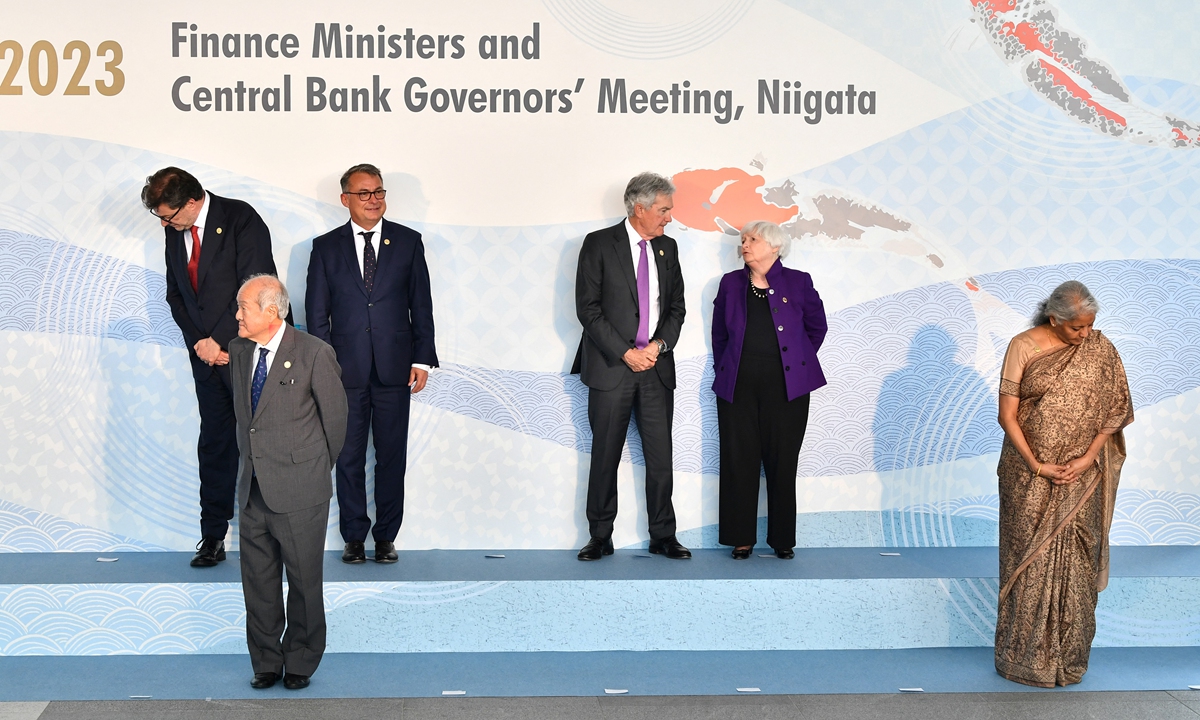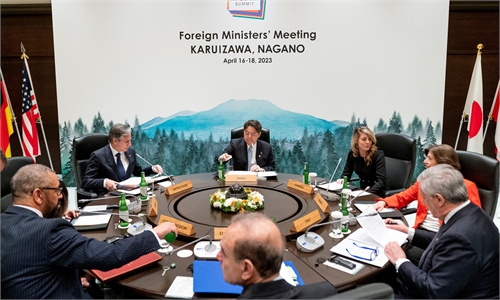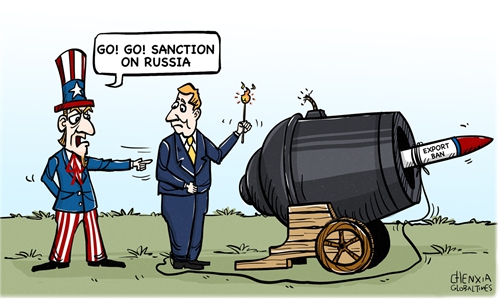US debt woes cast dark cloud over G7; radical anti-China plans face growing resistance

US Chair of the Board of Governors of the Federal Reserve System Jerome Powell (3rd from right) chats with US Treasury Secretary Janet Yellen at a photo session of the G7 Finance Ministers and Central Bank Governors' Meeting at Toki Messe in Niigata on May 12, 2023. Photo: AFP
As finance leaders of the Group of Seven (G7) countries continued their three-day meeting in Japan on Friday in preparation for the leaders' summit next week, Washington's gridlock over its debt ceiling issue has cast a dark cloud over the agenda and US officials' relentless push for radical anti-China moves is facing increasing resistance from allies.
For weeks, US and Japanese officials have been hyping about, among other things, plans to counter China at the upcoming summit in the Japanese city of Hiroshima from May 19-21. But some have raised concerns about whether US President Joe Biden will even be able to attend in person, as he has failed to reach any deal with US congressional leaders over raising the debt ceiling to avoid what could be a disastrous US default.
On Friday, Japanese broadcaster NHK reported that the "US debt ceiling issue may force Biden to cancel his trip to Japan for the G7 summit." The report came after a meeting between Biden and US congressional leaders on the debt ceiling issue that was scheduled for Friday was postponed until next week. Biden has already indicated that he may have to skip the trip if a deal cannot be reached in time. Without raising the debt ceiling, the US government could default on its obligations as early as June 1.
US politicians' brinkmanship over its debt ceiling issue has not just brought uncertainty to the G7 summit, but will also damage the US' leadership within the G7 and beyond. "It would also risk undermining US global economic leadership and raise questions about our ability to defend our national security interests," US Treasury Secretary Janet Yellen said on Thursday, while attending the G7 finance leaders' meeting in Japan.
At the finance ministers' meeting, US officials continued to push for its anti-China plans. Reuters reported on Friday that G7 finance leaders will debate the idea of targeted controls on investments to China, with the US at the "forefront in pushing for stronger steps against China." Also, US officials are pushing for "coordinated action" against what they call"China's economic coercion."
US 'the bully'
These attempts drew a harsh response from China on Friday. At a regular press briefing, Wang Wenbin, a spokesperson for the Chinese Foreign Ministry, said that "when it comes to economic coercion, the first one that should be condemned is prbably the US."
In pointed remarks, Wang said the US has repeatedly overstretching the concept of national security, abusing export control and taking discriminatory and unfair measures against foreign companies. This seriously violates the principles of market economy and fair competition.
Between 2000 and 2021, US sanctions against other countries and regions jumped by 933 percent. During the four years of Donald Trump's presidency, the US launched more than 3,900 sanctions, an average of three per day. The US has imposed unilateral sanctions against nearly 40 countries, affecting nearly half of the world's population, according to Wang.
"Not even G7 members have been spared from US economic coercion and bullying. Companies such as Toshiba from Japan, Siemens from Germany and Alstom from France, were all victims of US suppression," Wang said. "If the G7 Summit is to discuss response to economic coercion, perhaps it should first discuss what the US has done."
Some G7 countries are also pushing back against the US' radical plans. For example, while wary of China as a strategic rival, Germany is cautious, however, of being seen as forging a G7 front against Beijing given its heavy reliance on trade with the country, Reuters reported on Friday. A day earlier, citing a German government source, Reuters also reported that the G7 summit is not seeking to forge an anti-China alliance.
The US is facing difficulties in pushing for these anti-China moves, as it faces a serious domestic debt crisis and economic issues and, as shown in recent interactions between China and Europe and neighboring countries, many countries in fact do not think economic cooperation with China will turn into "economic coercion" against them, Sun Chenghao, a fellow and head of the US-EU program at the Center for International Security and Strategy in Tsinghua University, told the Global Times on Friday.
In recent months, Chinese officials have maintained a busy diplomatic schedule, with state visits, bilateral meetings and other diplomatic engagements with officials from countries on all the continents, including Europe, Africa, Oceania and Latin America. Almost in parallel with the upcoming G7 summit, China will convene the China-Central Asia Summit next week. This week, senior Chinese officials have even held talks with their US counterparts, including the meeting between China's top diplomat Wang Yi and US National Security Adviser Jake Sullivan in Vienna, Austria.
"Certainly, the US still wants to engage with China," Sun said, noting that it is the US strategy to simultaneously compete and cooperate with China. "It is now sending a stronger signal of engagement, but at the same time, it will not stop forging small-circle alliances like the G7."
Despite its chaotic domestic politics and declining credibility, the US still wields considerable influence over the G7 and other Western allies, effectively hijacking the G7 agenda to focus on its own geopolitical gambits, even though G7 countries are divided over a wide range of issues, including Japan's dumping of nuclear contaminated water into the ocean and the US' own anti-inflation and industrial policies.
He Weiwen, a senior fellow at the Center for China and Globalization, said that despite its divisions, the G7 will continue to hype anti-China stances such as "economic coercion," "distorted market," and impose technology bans.
"These positions are mainly those of the US, which is trying to rope in allies through the G7 mechanism," He told the Global Times on Friday, adding that while the G7 finance ministers' meeting will likely result in a joint statement that repeats those US positions, other G7 countries may not necessarily follow through. "France, Germany and Italy are unlikely to escalate their actions against China."
Meanwhile, the G7 is also trying to extend its influence over some emerging market economies, as the US-led bloc is trying to "diversify" supply chains away from China. The G7 finance leaders' meeting also invited finance chiefs from several countries such as Brazil, India and Indonesia.
However, the G7 is no longer a main platform for global governance, and while firmly opposing the G7's unfounded attacks on China and disruptions to global supply chains, China should actively promote multilateralism and global development initiatives on the G20 platform, and hedge against the influence of the G7 with the spirit of the G20 Finance Ministers' Meeting and the summit, He said.




